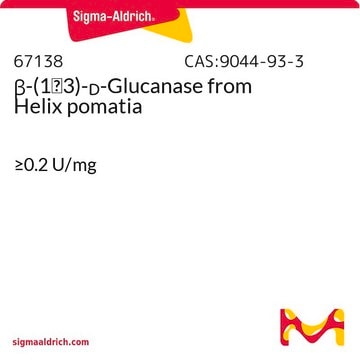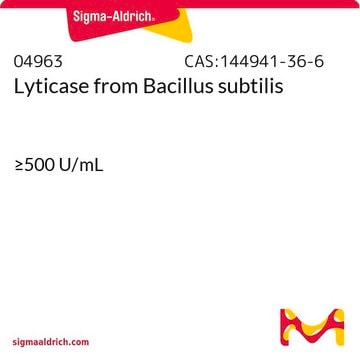L3768
Lysing Enzymes from Aspergillus sp.
powder
Synonim(y):
Cellulase, Lysing Enzymes, Pectinase
Zaloguj sięWyświetlanie cen organizacyjnych i kontraktowych
About This Item
Kod UNSPSC:
12352204
NACRES:
NA.54
Polecane produkty
pochodzenie biologiczne
Aspergillus niger
Postać
powder
metody
cell based assay: suitable
kolor
brown
przydatność
suitable for cell lysis
Zastosowanie
cell analysis
temp. przechowywania
2-8°C
Opis ogólny
Lysing enzymes are also known as lytic enzymes or cell wall lytic enzymes.
Zastosowanie
Lysing Enzymes from Aspergillus sp. has been used to digest the cell walls to create pulse-field gel plugs.
Lysing Enzymes from Aspergillus sp. has been used:
- to digest the cell wall of Schizosaccharomyces pombe
- to lyse the mycelium cell wall of Trichoderma harzianum
Działania biochem./fizjol.
Lysing enzymes are a group of enzymes that can break down the cell walls of microorganisms. These enzymes play a crucial role in various biological processes, including cell lysis, tissue dissociation, and protein extraction. Lysing enzymes are commonly used in research, biotechnology, and clinical applications. They are especially useful in DNA extraction, where they help to release genetic material from cells by breaking down the cell walls. This enables efficient isolation and purification of DNA for downstream analyses. Cellulases are a class of enzymes that degrade cellulose, a major component of plant cell walls, into simpler sugars. These sugars can be utilized as raw materials to produce biofuels, biobased chemicals, plastics, and various other materials. Pectinases are a group of enzymes that hydrolyze pectic substances found in microorganisms and higher plants. They can break down the pectin-containing compounds synthesized by plants and microbes.
Jakość
Contains pectinase and cellulase activities.
This page may contain text that has been machine translated.
Kod klasy składowania
11 - Combustible Solids
Klasa zagrożenia wodnego (WGK)
WGK 3
Temperatura zapłonu (°F)
Not applicable
Temperatura zapłonu (°C)
Not applicable
Certyfikaty analizy (CoA)
Poszukaj Certyfikaty analizy (CoA), wpisując numer partii/serii produktów. Numery serii i partii można znaleźć na etykiecie produktu po słowach „seria” lub „partia”.
Masz już ten produkt?
Dokumenty związane z niedawno zakupionymi produktami zostały zamieszczone w Bibliotece dokumentów.
Klienci oglądali również te produkty
New strains obtained after UV treatment and protoplast fusion of native Trichoderma harzianum: their biocontrol activity on Pyrenochaeta lycopersici
Besoain X A, et al.
Electronic journal of Biotechnology, 10(4), 604-617 (2007)
Unleashing the Promise of Biotechnology to Help Heal, Fuel, and Feed the World
Greenwood JC
Journal of biological and chemical chronicles (2014)
Pectinase from Microorganisms and Its Industrial Applications
Haile S and Ayele A
TheScientificWorldJournal (2022)
Tara L Mastro et al.
Journal of cell science, 133(10) (2020-04-23)
Translesion synthesis polymerases (TLSPs) are non-essential error-prone enzymes that ensure cell survival by facilitating DNA replication in the presence of DNA damage. In addition to their role in bypassing lesions, TLSPs have been implicated in meiotic double-strand break repair in
Translesion synthesis polymerases contribute to meiotic chromosome segregation and cohesin dynamics in Schizosaccharomycespombe
Mastro TL, et al.
Journal of Cell Science (2020)
Nasz zespół naukowców ma doświadczenie we wszystkich obszarach badań, w tym w naukach przyrodniczych, materiałoznawstwie, syntezie chemicznej, chromatografii, analityce i wielu innych dziedzinach.
Skontaktuj się z zespołem ds. pomocy technicznej








